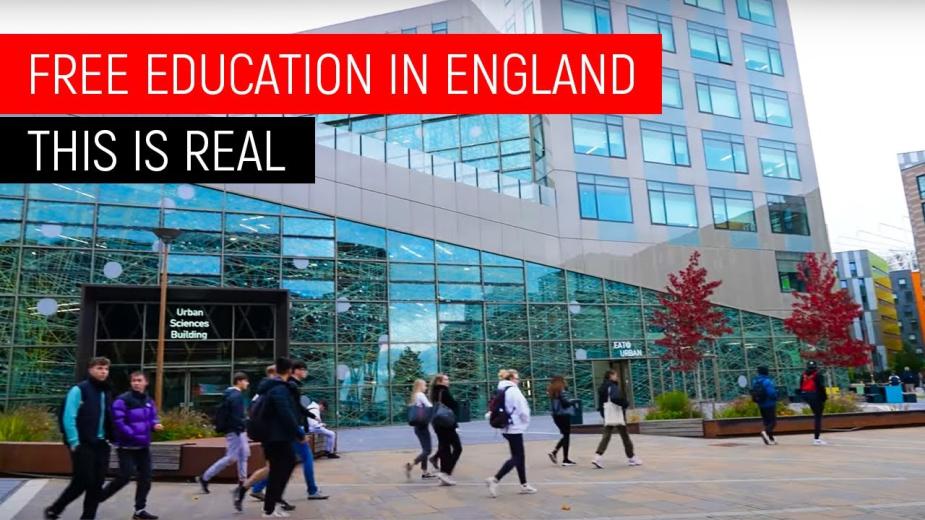Studying abroad often seems like something unrealistic and inaccessible, but in fact, there are a number of countries offering free programs for students, including foreigners.

Admission to foreign universities after the 11th grade
The transition from school to university is a responsible task, but feasible. Many countries in which education is free willingly accept students from other countries. You will need a high school diploma and a language level of at least B1. If the language is still a bit difficult, preparatory courses at universities can save you. Entrance exams tend to vary by country and university, so it's better to check their availability in advance. Also don't forget about the semester fees, which can be small but mandatory!

Availability of foreign education
Foreign education, despite all the difficulties of moving and adapting, often turns out to be more affordable than domestic education.
Germany
Germany is probably the dream of every student with ambitions. Free education is available in most of its territory, not counting Baden-Württemberg, but applicants to German universities are required to pay a small student fee, which will be used for administrative costs and a travel pass. But do not forget that you will need money to live. True, there are good scholarships in Germany, you can find a temporary job and receive social assistance from the state.

Education in Germany is conducted in two languages - German and English, knowledge of one of them is enough, but free education will be only in German. There are no entrance exams here, documents can be submitted directly. If you have doubts in your knowledge level, then take preparatory courses - almost all universities organize them.
France
French universities do not have a single standard for payment: some programs are free and can be found in both French and English. And what is important: state support includes health insurance and partial coverage of expenses! There are often no entrance exams here either, and you can enter immediately after school.
Italy
In Italy, there is free education in Italian or English. Each student can apply for a scholarship of 5,000 €, free meals and preferential places in dormitories. You can even work up to 20 hours a week, which will be a good financial insurance! But due to the peculiarities of the Italian school, in which studying lasts 12 years, you can enter here only after the 1st year of university (or 3-4 years in college) in case of 11 years of schooling.
Greece
In Greece, the conditions for applicants are paradise: there is free education, free accommodation, there is a scholarship for students, you can enter immediately after school - a certificate will be enough, the competition here is not high. But there is one nuance – studying is possible only in Greek. Universities give a year to learn the language.
Poland
Poland is friendly to students after the 11th grade, entrance exams for admission are not held here. If you confirm the level of the language or the presence of Polish roots, the financing program will provide you with everything you need.
Czech Republic
In the Czech Republic, free education is also conducted only in Czech, but you can enroll in a university, master's or doctoral program (for this, you will need to pass a language proficiency exam, entrance exams and nostrify your educational documents). There is no scholarship for students here, you will have to get out of it on your own.
Finland
In Finland, you can study in Swedish or Finnish, but you will have to take entrance exams. Scholarships are provided for postgraduate students.
Norway
In Norway, education is available in both Norwegian and English. To enroll in a bachelor's program, you should first study at home for at least a year. And the cost of living here is more compared to other European countries.
Slovakia
The conditions are similar to the Czech ones: you need to know the language, nostrify educational documents and pass entrance exams.
Iceland
Iceland provides free education in Icelandic and English, but English-language programs are only available at the master's level. There are good scholarship programs for future lawyers.
Austria
Austria will be a great option for you: here you can enroll immediately after the 11th grade and without preparatory courses, which makes life much easier for applicants.
Turkey
The Turkish Burslari program pays all tuition expenses in full by adding a monthly scholarship. But you will have to go through a serious selection - there are a lot of applicants, which is logical.
China, Japan and South Korea
Asian countries often offer international students grants to study:
- Chinese CSC fully covers tuition and accommodation, making education affordable and attractive,
- The GKS South Korean Government Scholarship also provides coverage for all tuition-related expenses,
- The Japanese MEXT program is an excellent path to free higher education for those who plan to study the Humanities and Social Sciences or Natural Sciences.
Tips for applicants abroad
- Apply to not one, but several universities - this will save you a lot of nerves and time.
- Finding out the requirements of each university is not just important, but vital! They may differ, but they must be strictly observed.
- Leave your modesty behind and communicate more actively with representatives of universities: students, graduates, teachers.
- Try to establish contact with your future supervisor in advance — this way you will quickly understand whether the chosen university is right for you.









